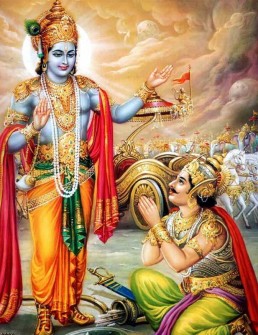Gita Chapter 8 – Verse 23 « »
यत्र काले त्वनावृत्तिमावृत्तिं चैव योगिनः ।
प्रयाता यान्ति तं कालं वक्ष्यामि भरतर्षभ ॥ ८-२३॥
yatra kāle tvanāvṛttimāvṛttiṃ caiva yoginaḥ
prayātā yānti taṃ kālaṃ vakṣyāmi bharatarṣabha 8-23
Now at what time (path) departing, YOGINS go, never to return, as also to return, that time (path) , I will tell you, O Chief of Bharatas.
yatra = at which; kāle = time; tu = and; anāvṛttiṃ = no return; āvṛttiṃ = return; ca = also; eva = certainly; yoginaḥ = different kinds of mystics; prayātāḥ = having departed; yānti = attain; taṃ = that; kālaṃ = time; vakṣyāmi = I shall describe; bharatarṣabha = O best of the Bharatas.;

